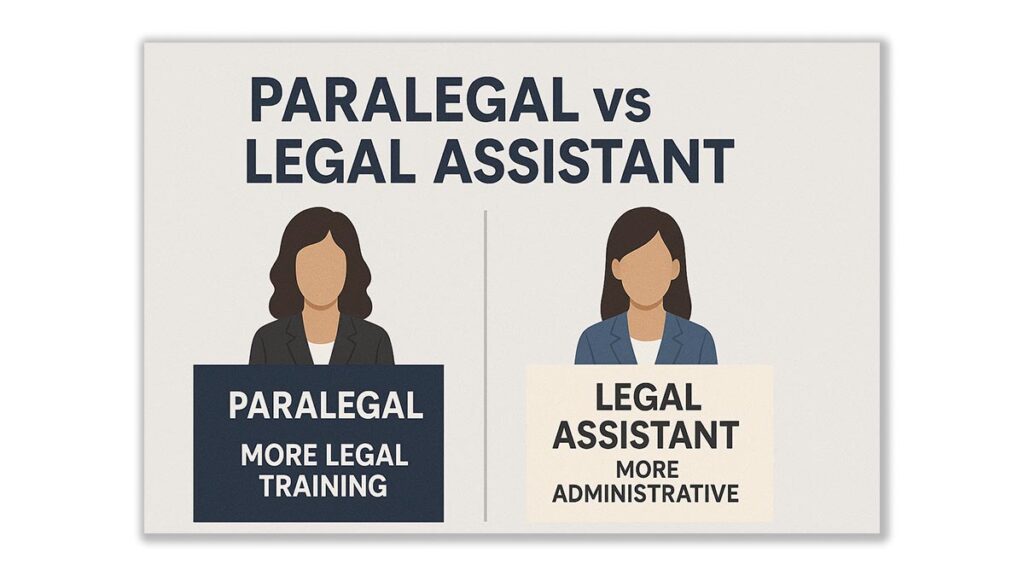Understanding the legal assistant paralegal difference is crucial for both law firms and clients. While these roles are often confused, they serve distinct purposes within a legal team. This article delves into their differences in responsibilities, qualifications, and contributions to law firm operations, helping you determine which role best fits your needs.
Legal Assistant vs Paralegal: What Are the Key Differences?

The legal assistant paralegal difference lies primarily in the scope of their responsibilities and the level of expertise required.
Legal Assistant Rol
A legal assistant focuses on administrative support tasks that ensure the efficient operation of a law office. Their duties include:
- Scheduling meetings and court appearances.
- Managing correspondence with clients and external parties.
- Organizing case files and maintaining records.
- Handling general office administration.
Paralegal Rol
Paralegals perform substantive legal work that supports attorneys in case preparation and legal analysis. Their responsibilities include:
- Conducting legal research and summarizing case law.
- Drafting legal documents such as pleadings, contracts, and discovery materials.
- Assisting attorneys in trial preparation.
- Managing client interviews and gathering case details.
Educational Requirements: Legal Assistant Paralegal Difference
Legal Assistant
- Typically requires a high school diploma or associate degree.
- Focuses on organizational and administrative skills.
- Certification programs are optional but can enhance career prospects.
Paralegal
- Often requires a degree or certification in paralegal studies.
- Professional certifications, such as those from NALA or NFPA, can significantly boost career opportunities.
- Legal knowledge and specialized training are essential for this role.
Maybe you will be interested Paralegal Offices Near Me: Your Guide to Expert Legal Support.

Ensure your intake team identifies high-quality cases from the start. Schedule a consultation to learn how Regentsrs can help your firm!
Why Both Roles Are Essential in a Law Firm
Understanding the legal assistant paralegal difference is key to optimizing law firm operations. Employing both professionals allows firms to allocate tasks effectively, balancing administrative and substantive legal work.
Benefits of Employing Legal Assistants
- Ensures smooth office operations.
- Reduces the administrative burden on attorneys.
- Cost-effective for handling routine tasks.
Benefits of Employing Paralegals
- Enhances case preparation and legal analysis.
- Improves efficiency in managing substantive legal tasks.
- Provides specialized support for attorneys during complex cases.
Legal Assistant Paralegal Difference: Cost and Compensation
The legal assistant paralegal difference extends to their earning potential, which reflects the complexity of their roles.
- Legal Assistant Salary: $35,000–$50,000 annually, with higher salaries in large firms or metropolitan areas.
- Paralegal Salary: $50,000–$70,000 annually, with experienced paralegals earning upwards of $80,000 in specialized fields.
How to Choose Between a Legal Assistant and a Paralegal
When deciding whether to hire a legal assistant or a paralegal, consider the following:
- Nature of Work: For administrative tasks, hire a legal assistant. For substantive legal tasks, a paralegal is more suitable.
- Budget: Legal assistants are generally more affordable, making them ideal for firms with tight budgets.
- Firm Size: Larger firms often employ both roles, while smaller firms may prioritize paralegals for their versatility.
How Regentsrs Supports Your Legal Team
At Regentsrs, we understand the unique value of both legal assistants and paralegals. Our skilled professionals are trained to deliver exceptional support tailored to your firm’s needs, whether you require administrative efficiency or specialized legal expertise.
Maybe you will be interested Legal assistant salary or paralegal.

Need highly skilled legal support for your law firm? Get in touch with us to discuss your firm’s unique needs!
Understanding the legal assistant paralegal difference helps law firms allocate resources effectively and deliver superior client service. By leveraging the strengths of both roles, firms can enhance efficiency and optimize operations. Next, explore how virtual legal support services are transforming modern law practices with cost-effective and flexible solutions.
Paralegal vs legal assistant salary
The debate over paralegal vs legal assistant salary often sparks questions about job responsibilities, required qualifications, and long-term career prospects. In this article, we delve into the core differences between paralegals and legal assistants, examine the factors that influence their earning potential, and provide insights to help law firm owners and partners make informed hiring decisions.
Salary Insights: Paralegal vs Legal Assistant Salary
When considering paralegal vs legal assistant salary, factors such as geographic location, firm size, practice area, and years of experience come into play. In major urban centers, paralegals often command higher salaries due to the complexity of cases and a higher cost of living. Meanwhile, legal assistants in these areas may also earn more than their counterparts in smaller markets, but the gap between paralegal and legal assistant compensation tends to be more pronounced.
Law firms focusing on specialized practice areas—such as intellectual property or complex litigation—may offer premium wages for paralegals with relevant expertise. By contrast, legal assistants working primarily in administrative roles may see more modest salaries, though additional certifications or advanced software skills can help boost their earning potential.
Additional Certifications and Education
Paralegals who pursue certifications from recognized institutions or who hold degrees in paralegal studies typically earn higher salaries. Legal assistants may also benefit from specialized training in law office software, client management systems, or legal billing processes, potentially narrowing the salary gap in the paralegal vs legal assistant salary comparison.


